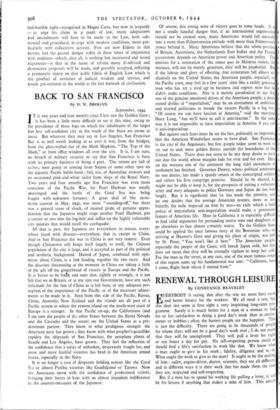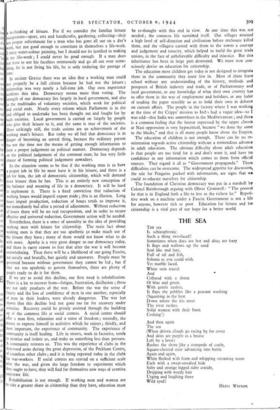RENEWAL THROUGH LEISURE
By CONSTANCE REAVELEY
EVERYBODY is saying that after the war we must have more and better leisure for the workers. We all need a rest, but this does not seem at first sight a very inspiriting long-term pro- gramme. Surely it is much better for a man or a woman to find his or her satisfaction in doing a good day's 'work than in amuse- ments or hobbies ; often the busiest people are the happiest. This is just the difficulty. There are going to be thousands of people for whom there will not be a good day's work ever ; I do not mean that they will be unemployed. They will pull a lever for eight or ten hours a day for pay. No self-respecting person could or should find a life's satisfaction in work like that. We know what a man ought to give to his work ; fidelity, diligence and so oll. What ought the work to give to the man? It ought to be the making of him: sailor, engine-driver, doctor, scientist, they are all'clifferent, and in different ways it is their work that has made them the men they are, respected and self-respecting.
But if a man has to spend his working life pulling a lever, it wil be his leisure if anything that makes a mhn of him. This entail'
pork, but not good enough to constitute in themselves a life-work. are proper refreshment for a man who has gone all out on a day's I enjoy water-colour painting, but I should not be justified in making it nv life-work ; I could never be good enough. If a man does I, re-thinking of leisure. For if we consider the familiar leistge occupations—sport, arts and handicrafts, gardening, collecting—they not have to use his faculties strenuously and go all out over some- for thing, he is not living his life, he is only enduring the passage of
time.
In ancient Greece there was an idea that a working man could
not properly be a full citizen because he had not the leisure ;
citizenship was very nearly a full-time job. Oqr own experience confirms this idea. Democracy means more than voting. The strength of our democracy lies largely in local government, and also in the multitudes of voluntary societies, which work for political and social ends. Nearly every reform which Parliament is in the end obliged to undertake has been thought out and fought for by such societies. Local government is carried on largely by people who give their leisure to it, and the same is true of the societies.
More strikingly still, the trade unions are an achievement of the working man's leisure. But today we all feel that democracy is in danger of becoming an unreal thing, because the ordinary person has not the time nor the means of getting enough information to form a proper judgement on political matters. Democracy depends on the political judgement of the common man; he has very little chance of forming political judgement nowadays.
of So the situation seems to be that if the working man is to have
a proper job in life he must have it in his leisure, and there is a rs job for him, the job of democratic citizenship, which will demand he more leisure than he has. This is an entirely new conception of 'er the balance and meaning of life in a democracy. It will be hard ok to implement it. There is a fixed conviction that reduction of ad working hours would imperil export trade ; this is an illusion. Long as hours impair production, reduction of hours tends to improve it,
not immediately but after a period of adjustment. Without reduction
lit of hours there will be no real recuperation, and in order to secure ut effective and universal reduction, Government action will be needed. to Nevertheless, there is a sense of unreality in the idea of providing lie working men with leisure for citizenship. The main fact about working men is that they are too apathetic o make much use of Id the leisure they have ; many of them would not know what to do le, with more. Apathy is a very great danger to our democracy today, at and there is every reason to fear that after the war it will become d. overwhelming. Then there w;11 be a likelihood of our going Fascist, gs not noisily and brutally, but quietly and unawares. People must be IC governed because without government they cannot be fed ; but if
they are too apathetic to govern themselves, there are plenty of people ready to do it for them.
If we are to avoid this decline, our first need is rehabilitation. There is a lot to recover from—fatigue, frustration, disillusion ; these are not only products of the war. Before the war the sense of fatuity and the loss of confidence of men in one another, especially Of men in their leaders, were already dangerous. The war has shown that this decline had not gone too far for recovery under stimulus. Recovery could be greatly assisted through the building Up of the common life at social centres. A social centre should offer a man first, relaxation and a sense of freedom ; secondly, the means to express himself in activities which he enjoys ; thirdly, and most important, the experience of community. The experience of community is itself healing. Life in streets, work in factories, tends to atomise and isolate us, and make us something less than persons. A community restores us. This was the experience of clubs in the distressed areas during the great depression, of the Peckham Centre, Of countless other clubs ; and it is being repeated today in the clubs for war-workers. If social centres are started on a sufficient scale after the war, and given the large freedom to experiment which they ought to have, they will find for themselves new ways of creative corporate life:
Rehabilitation is not enough. If working men and women are to take a greater share in citizenship than they have, education must be re-thought with this end in view. At one time this was not needed ; the comm3n life sustained itself. Our villages attained a high level of self-direction and civilisation before enclosure killed them, and the villagers carried with them to the towns a courage and judgement and tenacity, which helped to build the great trade unions, in the face of unbelievable difficulty and injustice. But this inheritance has been in large part destroyed. We must now con- sciously devise an education for citizenship.
The education most children get today is not designed to integrate them in the community they must live in. Most of _them leave school without any understanding of the history, methods and prospects of British industry and trade, or of Parliamentary and local government, or any knowledge of what their own country has to offer them in the way of employment and holidays, or any habit of reading the paper sensibly so as to hold their own in debates on current affairs. The people in the factory where I was working at the time of the Cripps' mission to Ind.a had a vague idea—so I was told—that India was somewhere in the Mediterranean ; and there is a common feeling that the horror expressed by the upper classes at Nazi oppression is very hypocritical, because "we done the same to the blacks," and that is all many people know about the Empire.
The education of children is• not enough. There can be no re- orientation toozards active citizenship without a tremendous advance in adult education. The obvious difficulty about adult education is that people are too tired for it and don't want it, and have no confidence in any information which comes to them from official sources. They regard it all as "Government propaganda." Thera difficulties can be overcome. The widespread appetite for discussion, the sale for Penguins packed with information, are signs that we could re-educate ourselves for citizenship.
The foundation of Christian democracy was put in a nutshell by Colonel Rainborough arguing with Oliver Cromwell : "The poorest he that is in England hath a life to live as the richest he." Repeti- tive work on a machine under a Fascist Government is not a life for anyone, however rich or poor. Education for leisure and for citizenship is a vital part of our hope for a better world.



























 Previous page
Previous page